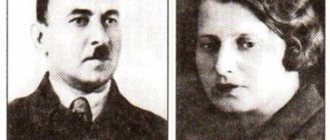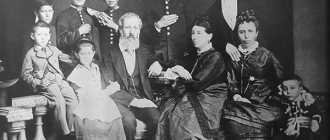Mashenka
Spring 1924 Lev Glebovich Ganin lives in a Russian boarding house in Berlin. In addition to Ganin, in the boarding house live the mathematician Aleksey Ivanovich Alferov, a man “with a thin beard and a shiny, plump nose”, the “old Russian poet” Anton Sergeevich Podtyagin, Klara - “a full-breasted, all in black silk, a very cozy young lady”, working as a typist and in love with Ganina, as well as ballet dancers Kolin and Gornotsvetov. “A special shade, a mysterious affectation” separates the latter from other boarders, but, “speaking in all conscience, one cannot blame the pigeon happiness of this harmless couple.”
Continued after advertisement:
Last year, upon his arrival in Berlin, Ganin immediately found a job. He was a worker, a waiter, and an extra. The money he has left is enough to leave Berlin, but to do this he needs to break up with Lyudmila, whose relationship has been going on for three months and he is pretty tired of. But Ganin doesn’t know how to break it. His window overlooks the railway track, and therefore “the opportunity to leave is constantly teasing.” He announces to the hostess that he will leave on Saturday.
From Alferov, Ganin learns that his wife Mashenka is coming on Saturday. Alferov takes Ganin to his place to show him photographs of his wife. Ganin recognizes his first love. From that moment on, he is completely immersed in the memories of this love; it seems to him that he has become exactly nine years younger. The next day, Tuesday, Ganin announces to Lyudmila that he loves another woman. Now he is free to remember how nine years ago, when he was sixteen years old, while recovering from typhus in a summer estate near Voskresensk, he created for himself a female image, which a month later he met in reality. Mashenka had a “chestnut braid in a black bow”, “Tatar burning eyes”, a dark face, a voice “moving, burry, with unexpected chest sounds.” Mashenka was very cheerful and loved sweets. She lived in a dacha in Voskresensk. Once, with two friends, she climbed into a gazebo in the park. Ganin started talking to the girls, they agreed to go boating the next day. But Mashenka came alone. They began to meet every day on the other side of the river, where an empty white manor stood on a hill.
Briefly exists thanks to advertising:
When, on a black, stormy night, on the eve of leaving for St. Petersburg for the start of the school year, he met her for the last time in this place, Ganin saw that the shutters of one of the windows of the estate were slightly open, and a human face was pressed against the glass from the inside. It was the watchman's son. Ganin broke the glass and began to “beat his wet face with a stone fist.”
The next day he left for St. Petersburg. Mashenka moved to St. Petersburg only in November. The “snowy era of their love” began. It was difficult to meet, wandering for a long time in the cold was painful, so both remembered summer. In the evenings they talked on the phone for hours. All love requires solitude, but they had no shelter, their families did not know each other. At the beginning of the new year, Mashenka was taken to Moscow. And it’s strange: this separation turned out to be a relief for Ganin.
Mashenka returned in the summer. She called Ganin at the dacha and said that her dad never wanted to rent a dacha in Voskresensk again and she now lives fifty miles from there. Ganin rode to her on a bicycle. I arrived already dark. Mashenka was waiting for him at the park gate. “I am yours,” she said. “Do whatever you want with me.” But strange rustling sounds were heard in the park, Mashenka lay too submissively and motionless. “It seems to me that someone is coming,” he said and stood up.
He met Mashenka a year later on a summer train. She got off at the next station. They never saw each other again. During the war, Ganin and Mashenka exchanged tender letters several times. He was in Yalta, where “a military struggle was being prepared,” it was somewhere in Little Russia. Then they lost each other.
On Friday, Colin and Gornotsvetov, on the occasion of receiving the engagement, Clara’s birthday, Ganin’s departure and Podtyagin’s supposed departure to Paris to visit his niece, decide to organize a “celebration”. Ganin and Podtyagin go to the police department to help him with a visa. When the long-awaited visa is received, Podtyagin accidentally leaves his passport on the tram. He has a heart attack.
The holiday dinner is not fun. Podtyagin is getting sick again. Ganin gives the already drunk Alferov something to drink and sends him to bed, while he imagines how he will meet Mashenka at the station in the morning and take her away.
Continued after advertisement:
Having collected his things, Ganin says goodbye to the boarders sitting at the bedside of the dying Podtyagin and goes to the station. There is an hour left before Mashenka arrives. He sits down on a bench in the park near the station, where four days ago he remembered typhus, the estate, Mashenka’s premonition. Gradually, “with merciless clarity,” Ganin realizes that his romance with Mashenka is over forever. “It lasted only four days - these four days were, perhaps, the happiest time of his life.” The image of Mashenka remained with the dying poet in the “house of shadows”. But there is no other Mashenka and there cannot be. He waits for the moment when an express train coming from the north passes over the railway bridge. He takes a taxi, goes to another station and boards a train going to southwest Germany.
Vladimir Nabokov "Mashenka"
"Mashenka" is an early work by Nabokov. This is felt from the very first pages, due to the fact that the writing style here is noticeably weaker than in the rest of the author’s work. Exorbitantly drawn out paragraphs of complex and complex sentences alternate with elegantly shaped inserts, which clearly demonstrates the promising inclinations of a still emerging writer.
It is especially important to note the first lines of the work. Many inexperienced writers, unable to come up with a strong opening sentence, avoid it by starting the story with an opening sentence and the dialogue that follows. Nabokov did the same, but “Mashenka” acquired a unique feature: its dialogues are not abstract exclamations hanging in the air, characteristic of the work of amateurs. The dialogues of this novel masterfully, with almost every word, outline the exposition, describe the actions, introduce the reader to the characters - and all this despite the fact that this moment is realized completely unobtrusively, and at the same time skillfully, because in literature it is not often possible to find such a multifunctional scene, built with using a dialogue of several phrases.
Further, the work lowers the level, revealing Nabokov's weakest feature at that time as a writer: clarification. Here the author is extremely weak - it is noticeable that he has no idea what he is doing, which is why he forms simply a cyclopean paragraph, where every sentence is full of repetitions of “was” and “stood” - parasites that plague the entire work, which greatly worsens the overall impression. In the subsequent narration, new words will appear that blur the eye, but these are the most characteristic and unnecessary. By the way, the descriptions themselves, such as the meticulous listing of furniture and its locations, which appear starting from this fragment, are unjustifiably redundant and also harm the novel.
Plot-wise, “Mashenka” is not intriguing, and approximately the first half of the work provides the reader with every reason to ask the question whether there is at least some kind of consistent story in it. Then the situation becomes clearer: the Russian emigrant Ganin learned that his neighbor in the Berlin boarding house is waiting for the arrival of his wife, in whose photograph, to his horror, the protagonist recognizes his former lover, with whom, as it turns out, he still has feelings. He blames circumstances for everything, and understands that he cannot live without her. This, as well as interesting side storylines, are presented in a beautiful minor note, and here, as always, we should give Nabokov his due - with inimitable grace and persuasiveness, he reveals the inner world of the characters, completely different from those they imagined in Lolita. or "The Wizard". Loss and inaccessibility - perhaps this is how one can characterize the mood of the work, characteristic of each of the few characters, each of whom encourages the formation of sincere sympathy for him.
The characters themselves are very interesting and varied, there is an old man who dreams of getting to his family, and a protagonist suffering from unfulfilled love, and Mashenka herself, with persistent despair sending letters to nowhere that receive no response. But still, the strongest side of “Mashenka” is the emotional background, which covers the dialogues, where the author even makes good jokes several times, political criticism, and short thoughts about love for the motherland.
Despite the fact that the work is early, and the style is rough and changeable, the imagery is maintained at a high level typical of Nabokov: vivid metaphors, precisely noted correspondences, vigilantly verified shades of feelings and phenomena - everything is masterfully transferred to paper.
We can say that “Mashenka” is not Nabokov’s best work, which is more suitable for readers who want to deepen their acquaintance with his work than for those who decided to take on his books for the first time.
Completion of the novel
As you can see, Nabokov paints a realistic and very life-like story in his novel.
The summary is coming to an end. On the eve of Mashenka's return, Ganin gives Alferov a drink at a celebration organized by Kolin and Gornotsvetov. He plans to meet the woman himself and go away with her.
In the morning, Ganin says goodbye to the boarders and goes to the station. There is an hour left until the train arrives. Gradually, thoughts begin to creep into Ganin’s head that his romance with Mashenka ended a long time ago. Without waiting for the woman to arrive, he goes to another station and leaves.
Image of Ganin
The image of the main character was largely copied from Vladimir Nabokov. “Mashenka” (an analysis of Ganin’s feelings and experiences as an emigrant) once again confirms this. In Berlin, no one needs him, and he doesn’t care about anyone either. Lev Glebovich is lonely and unhappy, depressed, his soul has been taken over by hopeless melancholy. He has no desire to fight anything or change anything.
Only memories of Mashenka revive the hero. Thoughts about the past revive his soul and body, illusory happiness warms him, pushes him to action, and gives him hope for the future. But this euphoria does not last long. Sitting at the station, waiting for Mashenka, he suddenly realizes that it is impossible to return the past, one can only dream about the lost paradise (Motherland), but it will never be possible to find it again.
The peculiarity of the end of the novel
Very often in this work, Vladimir Vladimirovich Nabokov plays on deceiving the reader’s expectations: Mashenka (the analysis of her image is presented above) never appears, the supposed love triangle, to which the arrangement of the main characters is pushing, turns out to be nothing, and the ending does not at all correspond to traditional literary techniques.
The end of the novel is more philosophical than psychological. Nabokov does not allow the characters to meet not because of deep emotional experiences, but because there is no return to the past.
Theme and idea
The analysis of the novel “Mashenka” by Nabokov should begin by defining the theme and idea. It seems that the theme of love in the work comes first and is the leading one, but this is not the case. In fact, the novel is dedicated exclusively to the lost homeland - Russia. All other subthemes and motifs are grouped around this image.
In the work, Nabokov, and with him the main character, are trying to regain their lost happiness and regain paradise. But the outcome turns out to be disappointing - what was lost cannot be returned, everything is over, all that remains is wandering, there is no turning back.
Plot and plot
If you conduct a thorough analysis of the novel “Mashenka” by Nabokov, it turns out that there is no plot in it as such. The content of the work is more reminiscent of a stream of consciousness: Ganin’s constant internal monologues, character dialogues, descriptions of places where this or that event occurs.
Of course, one cannot call the novel built on this alone. There is an outside view here - the narration is told from a third person, the description of space is characterized by a certain objectivity, the reader hears not only the voice of the hero, but also the speeches of other characters. However, the entire plot of the novel can be reduced to several events: Ganin is getting ready to leave, learns about the arrival of his long-time lover, remembers the feelings he experienced in his youth, is going to revive them, but at the last moment refuses this and leaves. It is in this paucity of actions that the originality and unusualness of Nabokov’s work is expressed, what makes him unlike either Russian or foreign writers.
Summary: the beginning
Before we begin the analysis, let us turn to a retelling of the plot of the novel “Mashenka”. The summary should begin to be described in the spring of 1934 in Berlin. The main character, Ganin Lev Glebovich, lives in a boarding house for Russians, where, in addition to him, live:
- Alferov Alexey Ivanovich (mathematician);
- Podtyagin Anton Sergeevich (old poet),
- “cozy young lady” Klara, in love with Ganin and working as a typist;
- a couple in love - ballet dancers Colin and Gornotsvetov.
Ganin arrived in Berlin a year ago, during which time he changed several jobs: orderly, worker, waiter. He managed to save enough money to leave, but first he needs to part with Lyudmila, with whom he has been in a relationship for three months, which the hero is terribly tired of. But Ganin cannot find a pretext for the breakup. The windows of his room, as luck would have it, overlook the railway, and the desire to leave becomes irresistible. In a fit of overwhelming feelings, Lev Glebovich announces to the hostess of the boarding house that he is leaving on Saturday.
History of creation
So, let's begin the analysis of Nabokov (“Mashenka” is the focus of our attention). The novel was written in 1926 in Berlin. It has many biographical motives, primarily related to longing for the Motherland, the unbearable sadness of an emigrant for a lost home.
In the Niva magazine, immediately after the release of the novel, a review of it was published: “Nabokov embroiders his fate according to the outline of his works... reflects the fate of an entire human type - the Russian emigrant intellectual.” Life abroad was, like for many people who left their home country, difficult. The only thing Nabokov could find solace in was memories of the past, where there was joy, love, home. It was these bright thoughts that formed the basis of the novel.



